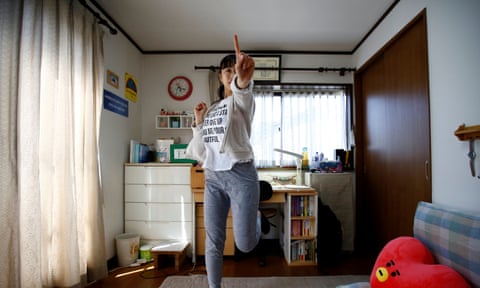Yuuka Hasumi put high school in Japan on hold and flew to South Korea in February to try to become a K-pop star, even if that meant long hours of vocal and dance training, no privacy, no boyfriend, and no phone. Hasumi, 17, joined Acopia school, a prep school in Seoul offering young people from Japan a shot at K-pop stardom, teaching them the dance moves, the songs and the language.
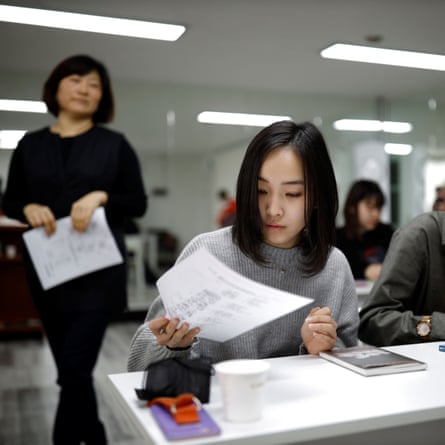
Yuuka Hasumi attends a Korean language class in Seoul, South Korea
She is one of an estimated 1 million K-pop star wannabes, from South Korea and beyond, hoping to succeed at highly competitive auditions held by major talent agencies, which will take on a select few as “trainees”.
“It is tough,” Hasumi says in Japanese, drenched in sweat from a dance lesson she attended with her 15-year-old friend Yuho Wakamatsu, also from Japan.

Yuuka Hasumi and Ibuki Ito perform at an Acopia school party in Seoul. Below: Hasumi shops after class


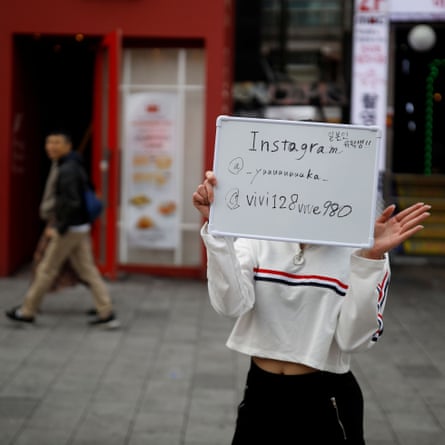
A microphone and speakers at a street performance in the Hongdae area of Seoul; Hasumi promotes her Instagram account during the performance

Yuho Wakamatsu takes photographs of Hasumi during a training session
“Going through strict training and taking my skill to a higher level to a perfect stage, I think that’s when it is good to make a debut,” she says.
Paying up to $3,000 a month for training and board, 500 or so young Japanese people join Acopia each year. The school also fixes auditions for its candidates with talent management companies, which have been the driving force behind the “Korean-wave” pop culture that exploded on to the world stage in the past decade with acts such as the boyband BTS.
An influx of Japanese talent is reshaping the K-pop industry at a time of increasingly bitter political acrimony between the two countries, which has damaged diplomatic ties. Tensions rooted in Japan’s 1910-45 colonisation of Korea have risen again after South Korean court rulings against Japanese companies for forced labour, and amid a perception in Korea that Japan’s leadership has not adequately atoned for its colonial past.

Wakamatsu adjusts her makeup
But the popularity of Korean culture and K-pop music is on the rise in Japan, with many fans and artists saying they are not bothered by diplomatic tensions. The willingness of Korean agencies to take on Japanese talent speaks to the strength of the ties between the two, according to one long-time observer. K-pop groups, and veteran Korean musicians, are selling out concert halls throughout Japan.
For schools and agencies, Japan’s music market – the second largest after the US’s – is a big prize and many have been on a campaign to recruit Japanese talent.
“It will be good if Japan and South Korea will get along through music,” Hasumi told Reuters during a break from a Korean language class.

A K-pop applicant performs at an audition in Tokyo
Some Japanese transplants have already made it big. The three Japanese members of the girl band Twice helped make the group the second most popular act in Japan, after BTS. Their success has prompted JYP Entertainment, the South Korean agency behind Twice, to plan a group that will comprise only Japanese girls.
Agency officials are reluctant to discuss their success in Japan and the infusion of Japanese talent, wary of fuelling a politically charged backlash, according to industry sources.
There is no shortage of Japanese hopefuls willing to train under the watchful eye of the agencies, some having left successful careers at home to go in search of K-pop fame.

Nao Niitsu, from Tokyo, and other Japanese young people warm up for an audition at a park in Seoul
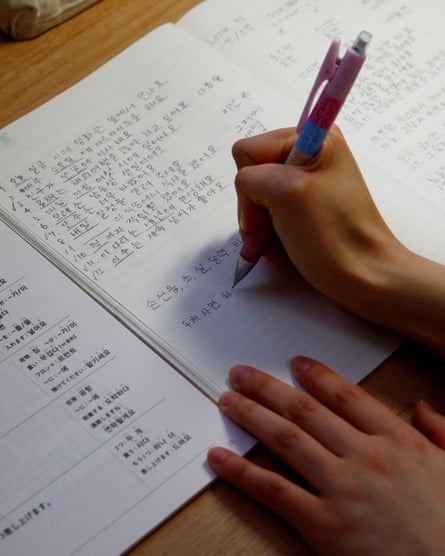
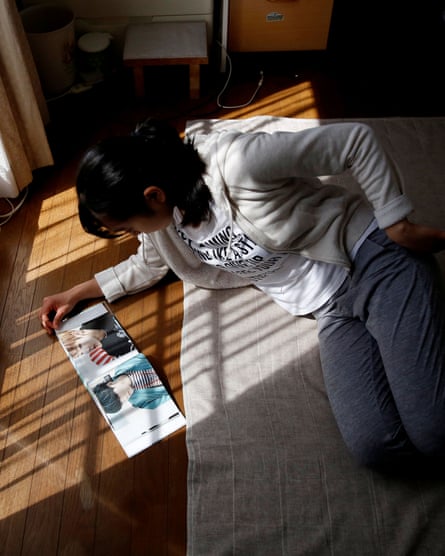
Nao Niitsu studies Korean in her room in Tokyo; she looks at a BTS photobook

Choosing a profile picture before her audition in Seoul
“I’ve heard stories about no free time or not being able to do what I want. But, I think all of K-pop stars who are now performing have gone down the same road,” says Nao Niitsu, a 19-year-old college fresher from Tokyo.
During a visit to Seoul paid for by her mother, a diehard BTS fan Niitsu auditioned for 10 agencies and was accepted by five.

Niitsu walks through Shin-Ōkubo district, known as Tokyo’s Korea-town
Miyu Takeuchi says it was not a difficult decision to leave a 10-year career with the top Japanese idol band AKB48 to sign with the K-pop agency Mystic Entertainment in March as a trainee. Even with her experience, she has seven hours of vocal training a day and two-hour dance lessons twice a week, plus early-morning Korean lessons. She is not allowed to have a boyfriend but says she has no regrets, despite the fact there is no guarantee she will make it.

Miyu Takeuchi sings during a training session in Seoul
